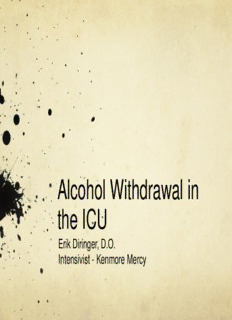
Alcohol Withdrawal in the ICU - AACN PDF
Preview Alcohol Withdrawal in the ICU - AACN
Alcohol Withdrawal in the ICU Erik Diringer, D.O. Intensivist - Kenmore Mercy Background Estimated 8 million alcohol (EtOH) dependent individuals in the United States 500,000 episodes of withdrawal requiring pharmacological treatment Kosten TR, O'Connor PG. Management of drug and alcohol withdrawal. N Engl J Med 2003; 348:1786. Who is prone to withdrawal? 1955 experiment EtOH-naive volunteers given continual EtOH Longer periods of EtOH = inc. severity of withdrawal Also possible genetic component (EtOH AND withdrawal) ISBELL H, FRASER HF, WIKLER A, et al. An experimental study of the etiology of rum fits and delirium tremens. Q J Stud Alcohol 1955; 16:1. DT Risk Factors Sustained EtOH Previous history Age >30 Comorbidities Longer time to presentation (inadequate early control of symptoms) Mortality Early 20th century 37% Now ~5% Arrhythmia, complications (aspiration) Failure to answer two questions 1. Are these symptoms secondary to EtOH withdrawal? (r/o toxic, metabolic, CNS) 2. Was there something that lead to cessation of EtOH? (Panc, hepatitis, CNS) Pathophysiology CNS depressant Inc. inhibitory tone via gamma-aminobutyric acid (GABA) EtOH binds to GABA with very high specificity (4) Dec. excitatory tone via blocked glutamate/N-methyl-D- aspartame (NMDA) Chronic EtOH yields GABA insensitivity and increased sensitivity to glutamate Need more EtOH to maintain normal tone In a nutshell… GABA NMDA Chronic EtOH Insensitive GABA - EtOH Sensitive NMDA In a nutshell... EtOH works by inc. inhibitory tone (GABA) and dec. excitatory tone (NMDA) Results to inhibition Withdrawal of chronic EtOH results in dec. inhibitory tone and inc. excitatory tone Results in excitation and symptoms of EtOH withdrawal Early Withdrawal Onset 6 hours Minor Insomnia, tremulouness, anxiety, GI upset, HA, diaphoresis, tachycardia, palpitations May occur with significant BAC Resolves in 24-48 hrs if no progression Later Withdrawal Onset usually 12-48 hrs May occur only after 2 hrs (9) Seizures - usually GTC Usually fleeting Prolonged, status deserves further investigation Treatment: benzos, phenobarbital No PHT/fPHT Failure to txt can lead to DTs in 1/3 of pts Victor M, Brausch C. The role of abstinence in the genesis of alcoholic epilepsy. Epilepsia 1967; 8:1.
Description: